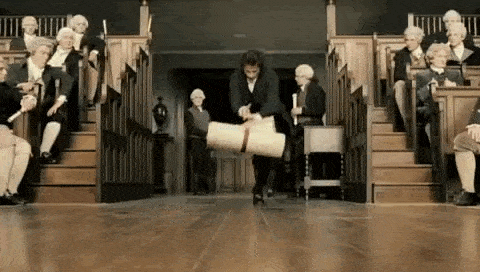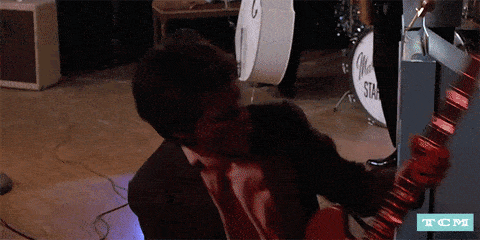You've decided to quit guitar or at least you're thinking about it. Fair enough. After all, it's easier to quit than to learn any new skill, and let's face it: it's human nature to take the easy way.
However, since you're willing to hear me out I'm going to make you a promise and I don't make promises lightly. I promise you that if you watch this video to the end, it will not be a waste of your time even if you decide to quit.
First, I'm going to talk about the main reason students have given as a reason for quitting guitar. Then I'm going to tell you why I believe all these reasons are just a cover story for a much bigger issue. I know it might be a bit controversial, but I just ask you to hear me out. I'll finish with a practical method that's proven to overcome it and it's something you can use in a much broader sense than learning guitar.
Common Reasons to Quit Guitar

One of the main reasons to quit is that it's frustrating to learn guitar, especially in the beginning.
There are a couple of main hurdles to overcome. The first one is just getting a chord to sound right. The second one is getting from one chord to the other. Additionally, sometimes it may seem like what you're doing will never actually turn into music that sounds good.
Another reason is that it's painful when you practice, and you get a sore back. Maybe the tips of your fingers are really sore, or your wrist is hurting. Also, you have no time to practice. However, when I dig a little deeper there seems to be an underlying issue. Maybe you're busy and it's hard to find time to practice and when you miss days of practice you feel guilty. So instead of getting tired of feeling guilty just quit.
Another reason is that you don't know what to practice and don't feel you're making progress. Finally, there's a somewhat nebulous one that's I refer to as lack of interest, feeling bored, or lost interest.
The Truth

Even though there are a bazillion different reasons for wanting to quit guitar, underneath it all they're really all coming from the same place. Remember when someone gets the idea to play guitar it's not just a whim, it's usually a passion or it's a deep desire they have. So, underneath all the reasons mentioned, there is doubt. Doubt that you will not succeed and that despite all the effort you may never actually play anything that sounds like good music. Maybe the thought is that you are not talented enough or just don't have what it takes. Perhaps you just feel like you're just too busy or too old or your fingers are too big or they're too small or you just lack motivation.
A Little Experiment

Try this experiment with me. Imagine that you had a guarantee that if you worked on something for a certain period of time, you would succeed. That if you do this for one or two years you will play the guitar in the way you envision it. If you are being honest, chances are you would not quit if you had a guarantee that you would improve. The issues you face wouldn't go away but you would just work them out as you go. Unfortunately, there isn't any guarantee, and we all have to live with the possibility of failure.
Ironically, that actually causes us to do things that will make that fear come true. For example, everyone knows that to be good at anything you have to practice consistently and take things a step at a time. Yet we practice sporadically and then we try songs or techniques that are way above the level that we're at. Ultimately, when someone quits, they're just tired of dealing with this tension.
Unfortunately, quitting and going back to life as normal means giving up on one of our dreams and taking another knock on our self-esteem. The solution is not to get rid of the doubts, but to create evidence that you can do this. The best way to do that is to create the habit of daily practice.
Some of you are thinking "if I was motivated or if I knew what to practice, I would practice". I'm going to challenge that and say it's backward. Motivation comes from making improvements and knowing what to practice comes from practicing figuring out what you need to do next. You then make more decisions, practice some more, and so on. When you create the habit of practicing, you can apply different methods to solve all the other issues. Naturally, this is easier said than done but it is doable by anyone.
Start Right Now
I'm going to give you one practical thing you can do right now. Before you give up, I want you to do a 30-day practice challenge. Here's how it works. Print out a 30-day challenge sheet. I've created one already and you can have a copy of mine in the link below. Make a commitment to practice for a minimum amount of time for 30 days straight with no breaks. That minimum can be a very small amount of time. If you're new to this, I recommend 10 minutes a day. After every practice session, I want you to cross out with red ink every day once you are done practicing for that day. Do it every day.
At the end of the 30 days, I want you to take a picture of the completed chart with your phone and send it to somebody to keep you accountable. You can send it to me if you wish. My email address is below. If you send it to me, I will respond.
The Habit is Key

The most important thing is developing the habit of practicing. It's not about how long you practice or how much progress you make. I've seen many students fail by trying to do too much, too soon.
So, focus on creating this practice habit and then you can expand on it.
Make it Easy to Practice

One way to do that is to have a space with everything set up and ready to go. It doesn't have to be an entire room though it's great if you have that. But even a little corner in one room will do. The idea is to minimize the barriers to practice, so look for ways to make it just easy for yourself. Don't spend too much mental energy or time setting things up.
Narrow it Down
Narrow down what you practice to something that you can reasonably be successful at. One example of that is when you're first starting out. Start with just a few chords (preferably just two) and work at getting them to sound good. Then take those two chords and work on changing from one to the other.
Once you get to about 80 percent (just a number I use to describe how you feel about how you're doing), you can then add the third chord and do the same thing. Then you're ready for the fourth chord.
Feeling Pain?

Are you feeling pain when you practice? Take time to stretch before you begin then start slow with a warm-up. Make sure to put no more pressure on the strings than you absolutely have to in order to get a good sound. Keep your practice sessions short.
What to Practice?
Don't know what to practice? You've got three choices: find an instructor to help you, sign up for some online lessons, or piece together your own program using YouTube and blog posts. Each of these choices has pros and cons. Whatever you decide, I recommend that you organize your practice time into three sections.
Start off with a warm-up. This is a smaller part of your practice. Then work on something that will move you forward that's just a little bit above your level. Then you end your practice with something you can do or something that's fun, so you leave on a positive note. This way you balance learning new things that'll keep you moving forward with doing stuff that makes you remember why you wanted to play guitar.
Here's a fact that may be hard for some of you to swallow- willpower and feeling motivated are overrated. Many students seem to think they need to feel motivated to practice. Or that they need to use willpower to make themselves practice. That is not necessarily so.
The Power of Habit

It's much more effective to use the power of habit to work for you instead of against you. Leave the willpower thing as kind of a backup and consider it something that's in scarce commodity.
Feeling motivated is just a bonus that you can't depend on.
I Did the Challenge

I also just completed one of the 30-day practice challenges and it really helped me a lot. I actually enjoyed crossing each day with an X. It was kind of fun even when I had a difficult day. Putting that X helped me feel like I had one small success for that day, and I found that because I didn't want to break the chain it gave me extra incentive to do my practice.
There were a few days in there where I thought I would fail, but I did not want to ruin my streak of many days with the X's lined up. I found that practicing got easier with this continuity.
In the past when I would not practice for a few days, I would often forget what I should be working on or what I worked on last, and it was kind of hard getting started. But now, because I was practicing every day it was easy for me to remember what I practiced the day before and what I needed to work on and to notice the improvement little by little.
This process is definitely a confidence builder, and I don't mean just for playing guitar. It proved to me that I can make a commitment to myself and keep it. I know it seems like a small thing but it's one of those small things that make a big difference in how I feel about myself.
I've included links below with more details on many of the tips mentioned. You'll find this very useful. There's also a link to download your very own 30-day practice challenge chart.
Try it For Yourself

Try this 30-day challenge and you are going to be nicely surprised. The power of habit is the key to constant practice that leads to growth. With this challenge and the advice above, I am sure you will experience noticeable progress in your playing, and you will open your eyes to just how effective this challenge really is. Have fun!
Would you like to try the 30-Day Challenge? Click on the link below!


Thank you Tomas, your contribution is enormous and you are making a very wide impact on such a lot of souls. Your lessons have been very helpful. I am constantly learning something new from them. Though I've made a "full stop" on my practice because of intense work on my Thesis paper in the recent time, I've decided to pick up from where I've left starting with today. Because I need to clear my mind of writing and to proceed with the progress in my acoustic guitar playing and experience some joy of learning once again. Though I didn't give my guitar a name yet. The famous singer – Amy Winehouse named her own guitar "Cherry". I will have to think about it.
To all my sisters and brothers in learning – keep up the pace and most of all – enjoy your learning 😀 and keep the good faith in yourself. Because it is like writing a Thesis paper – learning doesn't get done by itself – you have to write each day anything, to get to the final point – a full Thesis paper.
Thank you Tomas!!!!
Have a great day everyone!!! 😀